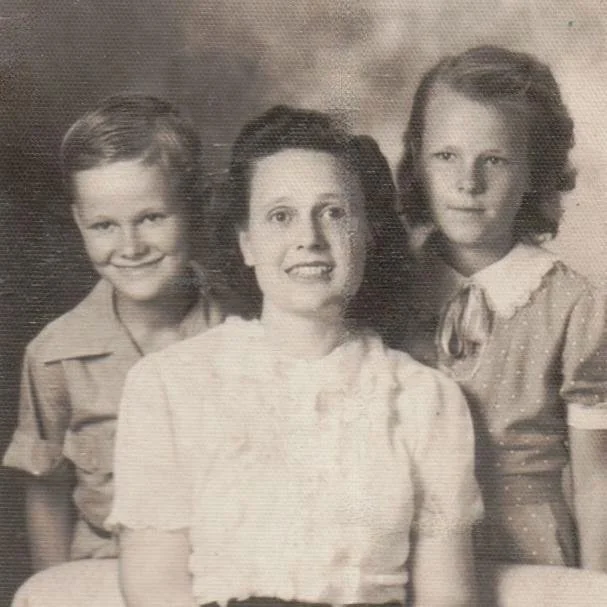A Real Human Life
My grandmother Ruth with her children from her first marriage.
Reading time: About 5 minutes.
Sometimes I get caught up wondering what a meaningful life is supposed to look like.
I scroll past stories of people “changing the world,” building empires, winning prizes. I hear phrases like “find your purpose” or “leave your mark,” and something in me tightens. I start questioning if I’ve done enough. If I’m being enough. If I’m living a big enough life to matter.
And then I think of my grandmother.
She never set out to change the world. But she changed mine. And my father’s. And possibly yours, in some small way, just by me telling this story.
She lived what I’d call a real human life. Not the shiny, curated kind. Not the kind that gets written up in memoirs or mentioned in commencement speeches. But the kind of life that holds a family together. That carries people through hard times. That tends to love like it’s something sacred. Because it is.
Her life was not easy.
Her first husband wasn’t a good man. Or maybe he was just trying to figure out how to feed his family during the Depression. Either way, he was gunned down while trying to rob some people. In the aftermath of his death, she was left to raise two small children on her own, all while fending off a predatory father-in-law.
She and her little brood eventually moved off that farm to Fort Smith, Arkansas, where she worked as a pastry chef, though that’s not what anybody called her. She baked pies and pastries from scratch in the early mornings for an interstate diner and waitressed there, too.
Grandma Ruth never made enough money to live without government assistance. But she accepted help when it was needed. She was proud, but not so proud to starve. She understood something we too often forget: that survival isn’t weakness. That asking for help is part of tending a family. That strength isn’t just standing on your own—it’s knowing when to lean.
And I can’t help but wonder: would she have needed government assistance if the world had valued the kind of labor she gave so freely? The tending of children, the feeding of generations, the holding of grief and joy in equal measure—none of it came with a paycheck. Millions of people (mostly women) do this work every day. It keeps the world spinning. But we’ve never built systems that reflect its worth.
Later, she remarried and had my father. Then, in an unimaginable twist of fate, she lost her first son in a motorcycle accident just a month before his high school graduation. And a few years after that, her second husband—my grandfather—died of cancer when my dad was only 18.
She never remarried.
I don’t think she ever had the luxury of asking big questions about purpose or legacy. She didn’t have time to search for enlightenment or self-actualization. And yet… she embodied them. Not through striving, but through showing up. Through loving. Through enduring.
And somehow, all that tending was enough.
By the time I came along, she had turned her attention fully to our family. She taught me how to saucer and blow my coffee, how to make cinnamon rolls and stovetop chocolate candy. She gave me rituals and routines—but more than that, she gave me a sense of rootedness.
She didn’t talk about being strong. But she was.
She didn’t talk about being a leader. But she led.
When she was older and proud of my father’s work as a minister, she saw that many seniors in the church had no way to get to Sunday service. So she quietly organized a solution. She worked with church leaders to set up a transportation system to pick them up and drop them off each week. She called everybody who needed a ride and organized the schedule. No fanfare. Just action. She didn’t wait for permission. She saw a need and met it. That was her way.
I don’t know if she ever sat down to wonder what her legacy would be.
But I do know this: I am who I am because she was who she was.
Sometimes I think we overcomplicate what it means to be human. We chase after meaning, try to “find our why,” dig deep into the self, hoping to uncover something sacred. But maybe we’re looking in the wrong place.
Maybe the sacred isn’t buried.
Maybe it’s already here—in the folding of clothes, the sharing of meals, the showing up even when your heart is broken. Maybe we don’t need to transcend anything. Maybe we just need to tend to what’s already ours.
My grandmother didn’t dig. She tended. And that was enough.
She didn’t change the world. But she changed her world—and the worlds of those who came after her. Maybe that’s what legacy really is. Not something you carve into stone, but something you pass hand to hand. A quilt of love and memory. A presence that lingers.
I still forget, sometimes. I still think I need to do more, be more, make more of an impact. But then I remember her.
I remember how a real human life doesn’t always need to be big.
It just needs to be rooted. Honest. Given with love.
And I find myself breathing a little easier.
We don’t have to dig our way into meaning.
We just have to tend what’s already growing.
